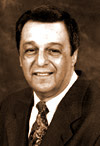WANT TO TALK ABOUT David Letterman? You could visit his home page, but there’s no opportunity there for fan feedback. Over in the Internet’s Usenet newsgroups, however, there’s a group called alt.fan.letterman, and it exists solely for the purpose of trading stories about your favorite TV host.
Usenet is an Internet realm dedicated to exchanging messages. Order is imposed by a hierarchical structure in which specific groups are named by discussion topic, and by the efforts of the Usenet community to ensure that messages from rambunctious individuals don’t get out of hand or stray too far off-topic within a given group.
Assuming your interests aren’t too outré, there are Usenet newsgroups devoted to them. And you can find plenty of wacky ones out there, too. Want to keep up with Jeeves and Bertie Wooster? Go to alt.fan.wodehouse. Getting married soon? Do some research in soc.couples.wedding. Do you fear nothing? Try alt.acme.exploding.newsgroup.





























